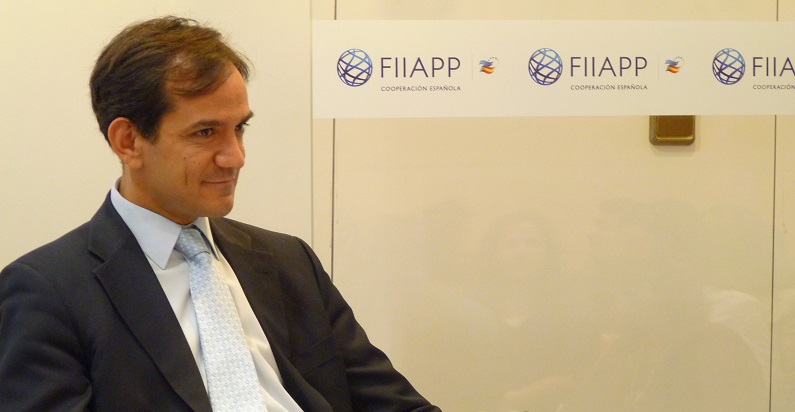-
30 June 2014
Category : Interview
“Spain doesn
Interview with David Izquierdo, diplomat and CBRN Technical Adviser of the Ministry of Foreign Affairs and Cooperation (MAEC).

All United Nations member countries are required by UN Resolution 1540 to reduce chemical, biological, radiological and nuclear (CBRN) threats by adopting effective legislative measures that prohibit and prevent the proliferation or improper use of elements that can be used to cause incidents of this type. International cooperation in prevention and mitigation of these events is a priority for the European Union. Thus it drives 40 projects and runs eight excellence centres in different regions of the world to promote structural measures to reduce the vulnerability of countries to possible CBRN situations.
David Izquierdo, diplomat and Technical Adviser of the Spanish Ministry of Foreign Affairs and Cooperation (MAEC) on these issues explains the role Spain is playing within this framework.
What type of international cooperation in the area of CBRN is Spain pursuing?
We have two main focal points: North Africa and Ibero-America. In terms of North Africa, contacts exist with the two largest countries in this region: Morocco and Algeria. In Morocco, for example, we have held joint drills for responding to risk situations and accidents, and we are also collaborating in the preparation of a joint Action Plan for CRBN issues.
With regards to Ibero-America, the country we have traditionally had the closest relationship with is Mexico, as it is the one that has shown the greatest interest in CRBN and most developed its internal capabilities. In January we held a joint workshop in Madrid on Resolution 1540 with the participation of the United Nations and a total of 10 Ibero-American countries. Likewise, we are developing increasingly greater collaboration with other countries, notably Colombia.
More specific workshops have also taken place. One is currently being held in Madrid with Ibero-American countries on biological issues, and a few days ago we collaborated in the organization of another seminar in Ecuador on this same topic.
Another common effort from Spain and the European Union is the creation of a CRBN reference centre in Ibero-America.
This is one of our objectives and priorities. In principle, one of the criteria followed by the EU for locating the excellence centres is that of geographic proximity to Europe as well as to zones where a more palpable risk of threats exists. Central Asia and the southern borders of the European Union were the areas that awakened the greatest concern. We are in favour of the greatest possible representation of different world regions in this initiative, and we want one to be established in Ibero-America in the short or medium term. There have already been contacts with certain countries that have expressed an interest in having one of these Centres, as reflected, for example, in the Joint Declaration of the Mexico-European Union Summit held in Los Cabos in 2012. We believe that the element of geographical proximity can be important, but that the visibility of the initiative and of the EU’s efforts in this area make the opening of an Excellence Centre in Ibero-America very necessary.
How do you rate the work of the FIIAPP in the area of CRBN?
I believe the data speaks for itself. The FIIAPP is the number two institution out of all those participating in this initiative at the European level in terms of budget for CRBN cooperation. If it wasn’t working effectively, they wouldn’t have granted it the seven projects it is implementing; to which we should add how it has carried out the cooperation work with the MAEC, the monitoring work, etc. Something very important has been achieved that goes well beyond what you would expect in terms of our population, size, GNP, etc.
What does the National Plan for implementing UN Resolution 1540 consist of?
Resolution 1540, approved 10 years ago, establishes a series of obligations for States, not only in terms of actions and concrete measures but also in terms of documentation that must be submitted, reports, etc. On the one hand, it requires a report on specific actions, which Spain has submitted on three different occasions, as well as an overall Action Plan at the State level to successfully institutionalize the cooperation work of the different government ministries in this area. A lot of progress had been made in this internal cooperation process in our country, where, starting with the MAEC initiative and for the purpose of addressing our responsibilities in these areas, different working groups have been created for CRBN issues with the participation of the different institutions which play a leading role in this issue: Presidency, Foreign Affairs, Defence, Interior… The Action Plan will raise the status of and institutionalize the coordination between the different departments.
Is Spain prepared to confront a CRBN incident?
Spain doesn’t lag behind any of the countries in our part of the world in CBRN. Ibero-American countries, as well as our neighbours in the Maghreb, for example, have requested our assistance and collaboration. The fact that Spanish institutions are implementing EU programmes means that we are up to the challenge. Our experts are very well regarded abroad, and different organizations such as the United Nations utilize them on many occasions. I believe we are prepared to confront a threat of this type and aware that we must continue our work in this area to maintain this level and these capabilities. Likewise we must be aware that all collaboration with third countries contributes directly to the security of all of us, and therefore we must deepen our efforts along these lines.
The views and opinions expressed in this blog are the sole responsibility of the person who write them.




